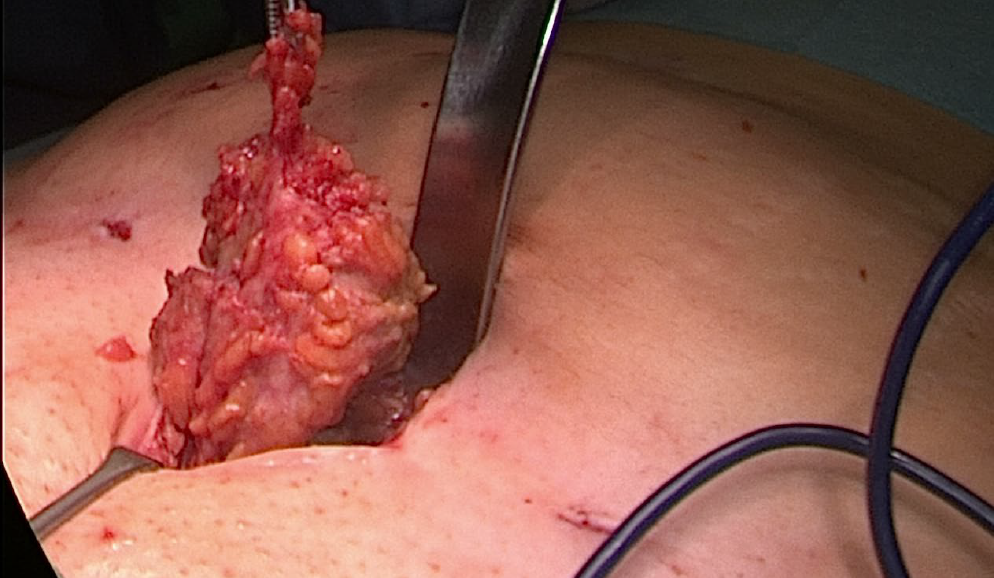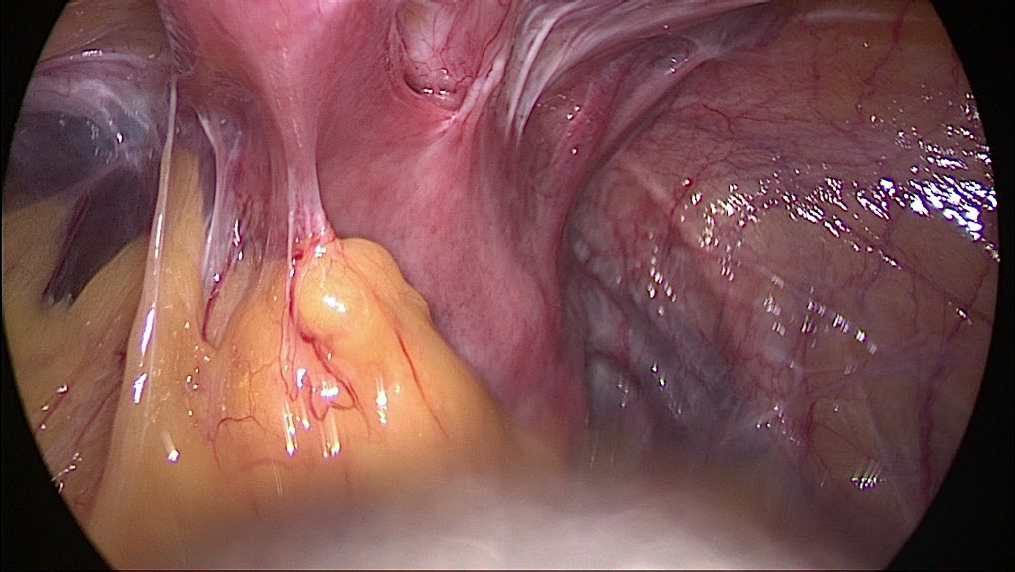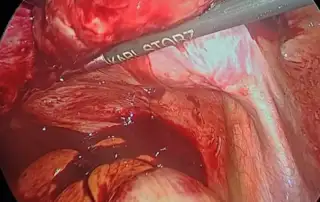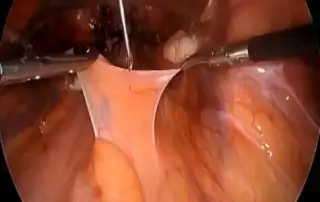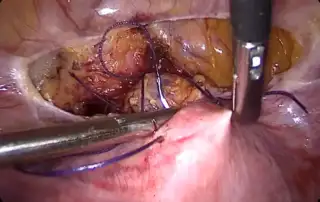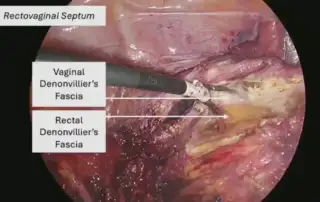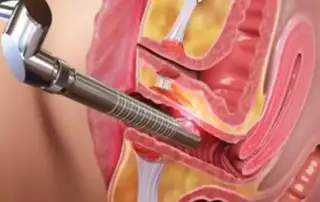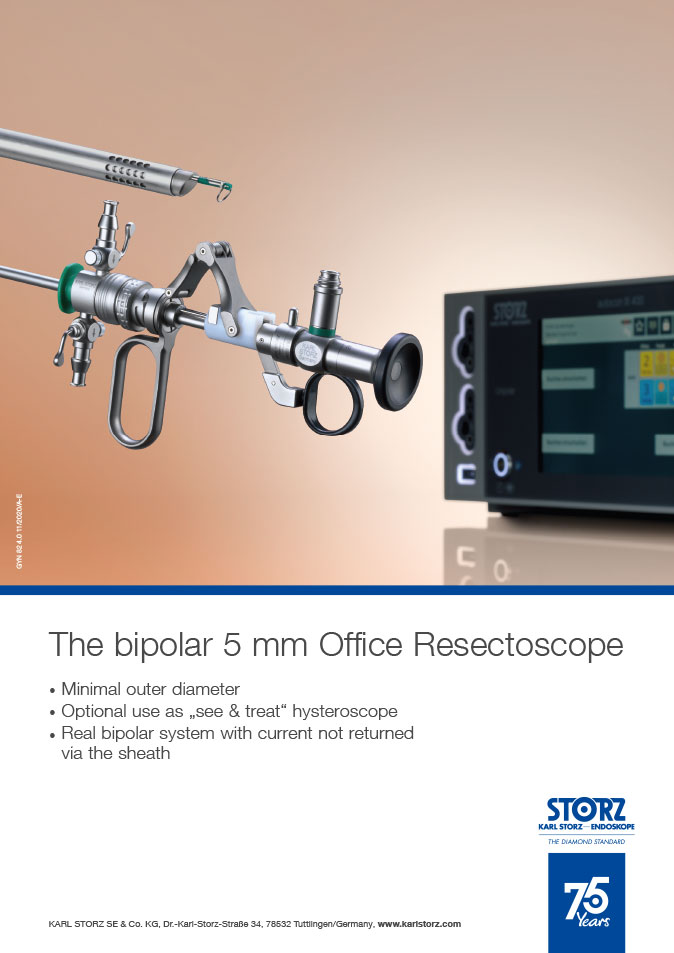The landscape of gynecological surgery has changed considerably. Over the past few decades, minimally invasive techniques, driven by advances in technology and surgical know-how, have drastically improved the outcomes and safety of gynecological procedures. One of the leading organizations advocating for these innovations is the International Society of Gynecological Endoscopy (ISGE). As the world faces increasing geopolitical instability, economic challenges, and competing global priorities – especially after wars and international conflicts – the role of ISGE becomes even more important. This essay examines the importance of ISGE for the future of gynecological surgery, especially in emerging, developing and developed countries, and examines how the challenging global context can shape the future of the discipline. Continue reading introduction …
Caesarean scar Endometriosis; 2 Uterus stuck at the abdominal wall after caesarean section.
Index: TheTrocar Volume 5 – Issue 4. 2024
Introduction
Article list
- The Reproducibility of the Endometriosis Fertility Index: Inter-and Intra-Observer Variation in the Least Functional Score
Annelize Barnard
DOI: 10.36205/trocar5.2024018 - Salpingostomy instead of salpingectomy in the surgical treatment of ectopic tubal pregnancy: literature review and case report
Marco Delgado
DOI: 10.36205/trocar5.2024019 - Reduction of Post Surgical Pain and Additional Pain Medication with Superior Hypogastric Nerve Modulation in Minimally Invasive Hysterectomies
Victor J. Carrasco
DOI: 10.36205/trocar5.2024020 - Role of Hysteroscopy in diagnosis and management of Adenomyosis: A review
Rahul Manchanda
DOI: 10.36205/trocar5.2024021 - Niche pregnancy complicated by bleeding: A case report
Anna Pitsillidi
DOI: 10.36205/trocar5.vid24006 - Deep Endometriosis with Intestinal Involvement Video case report
Lucia Chau
DOI: 10.36205/trocar5.vid24007 - Applications of Lasers in Gynecology- A Comprehensive Review
Vidya V Bhat
DOI: 10.36205/trocar5.2024023 - An unusual case of bowel incarceration following uterine perforation
Zeynep Toksoy Karaşin
DOI: 10.36205/trocar5.2024024
Full articles open access
The Reproducibility of the Endometriosis Fertility Index: Inter- and Intra-Observer Variation in the Least Functional Score
DOI: 10.36205/trocar5.2024018
Salpingostomy instead of salpingectomy in the surgical treatment of ectopic tubal pregnancy
DOI: 10.36205/trocar5.2024019
Role of Hysteroscopy in diagnosis and management of Adenomyosis
DOI: 10.36205/trocar5.2024021
Reduction of Post Surgical Pain and Additional Pain Medication with Superior Hypogastric Nerve Modulation in Minimally Invasive Hysterectomies
DOI: 10.36205/trocar5.2024020
Niche pregnancy complicated by bleeding
DOI: 10.36205/trocar5. vid24006
Deep Endometriosis with Intestinal Involvement
DOI: 10.36205/trocar5. vid24007
Applications of Lasers in Gynecology- A Comprehensive Review
DOI: 10.36205/trocar5.2024023
Antenatal Myomectomy
DOI: 10.36205/trocar5.2024022
An unusual case of bowel incarceration following uterine perforation
DOI: 10.36205/trocar5.2024024
The importance of ISGE for the future of global gynecological surgery
The landscape of gynecological surgery has changed considerably. Over the past few decades, minimally invasive techniques, driven by advances in technology and surgical know-how, have drastically improved the outcomes and safety of gynecological procedures. One of the leading organizations advocating for these innovations is the International Society of Gynecological Endoscopy (ISGE). As the world faces increasing geopolitical instability, economic challenges, and competing global priorities – especially after wars and international conflicts – the role of ISGE becomes even more important. This essay examines the importance of ISGE for the future of gynecological surgery, especially in emerging, developing and developed countries, and examines how the challenging global context can shape the future of the discipline.
1. The need for ISGE in emerging and developing countries
In emerging and developing countries, access to advanced medical technology and surgical training is often limited or impossible due to both financial and infrastructural challenges. Gynecological health, including the treatment of conditions such as fibroids, consequences of childbirth, endometriosis and cancer, often takes a back seat in countries struggling with basic health infrastructure. People who receive surgical treatment at all are often treated with traditional surgical methods, which can be more invasive, for cost reasons, even though these methods are often associated with longer recovery times, higher complication rates, and longer hospital stays.
The ISGE plays a dual role in tackling these problems. ISGE’s commitment to educating surgeons in low-resource environments provides the skills and knowledge to perform minimally invasive surgeries. By promoting laparoscopic and endoscopic techniques, ISGE helps to reduce the negative side effects of open surgery and postoperative care, as well as costs in the long term. These techniques also lead to fewer complications and shorter recovery times, which is especially important in countries with limited health resources and long waiting times for treatment. In addition, ISGE’s emphasis on improving surgical outcomes directly translates into a higher quality of care, allowing these countries to meet the growing demand for gynecological services.
ISGE’s focus on global collaborations can help foster partnerships between developed and developing countries, which are critical to providing affordable solutions to underserved populations. The training offered and supported by ISGE is often less expensive than sending practitioners abroad, which reduces the financial burden on already overstretched health systems. An important contribution to this is that many members of the ISGE are willing to do voluntary work.
2. The role of ISGE in developed countries
In developed countries, the importance of ISGE extends beyond basic education to innovation, research, and patient-centered care. High-income countries often have more advanced healthcare infrastructures, but they also face unique challenges, such as rising healthcare costs, an aging population, and rising patient expectations. Minimally invasive gynecological surgery, which is a focus of ISGE, has proven to be an effective means of meeting these requirements. By allowing surgeons to perform complex procedures through smaller incisions, laparoscopy and other minimally invasive techniques reduce the risk of infection, shorten recovery times, and improve the overall patient experience. This shift towards less invasive approaches also helps to reduce the financial burden on healthcare systems, as patients can return to their normal lives more quickly and require fewer hospitalizations and less post-operative care.
In developed countries, where the focus is often on precision medicine and technological advancement, ISGE provides a platform for collaboration between practitioners, researchers, and medical device manufacturers. This collaboration is critical to developing new tools and techniques to ensure that gynecological surgery stays on the cutting edge and patients benefit from the latest innovations.
3. The Global Context: Geopolitical Instability and its Impact on Health Care
The challenging global environment, characterized by ongoing wars, international conflicts, and political instability, has far-reaching consequences for health systems, especially in countries that are already facing economic challenges. In recent years, conflicts in the Middle East, Africa and Eastern Europe have drained resources from health systems, leading to a deterioration in access to health care, a shortage of medical care and the displacement of health professionals. These situations often leave civilians, including women, vulnerable to inadequate gynecological care, and some even lack access to basic services.
As resources are diverted to military efforts and international conflicts, there is a real danger that global health initiatives, including advances in surgical techniques, could suffer. ISGE continues to seek to offer its expertise by providing training and educational resources through virtual platforms and mobile workshops, despite geopolitical and financial challenges, despite an increasingly challenging environment. The ability to adapt to changing circumstances and create accessible learning environments allows ISGE to reach a wider audience, even in conflict areas where traditional methods of education and training are not practical.
4. Conclusion: A vision for the future
The future of gynecological surgery is closely linked to the continuous efforts of organizations like ISGE to bridge the gaps between technological advancements, education, and accessible care.
With global challenges arising from geopolitical instability and conflict, ISGE’s focus on accessible education and collaboration is more important than ever. Given the strain on resources caused by wars and economic crises, ISGE’s commitment to expanding access to quality gynecological care despite financial and logistical barriers has the potential to change the future of gynecological surgery worldwide. Through the use of technology, fostering international partnerships, and continuing education, ISGE positions itself as a key player in ensuring that advances in surgery reach all corners of the world, regardless of the political or economic challenges ahead. Society’s commitment to improving women’s lives through innovative surgical care will remain a cornerstone of progress in both developed and developing countries, offering hope for better, more equitable healthcare in the years to come.
We are happy about any support through active volunteer work, donations or partnership, membership and everything that is conceivable to continue our work successfully.
Thanks to all supporters of ISGE and we wish everyone a happy new year 2025.
Guenter Noé
Editor in chief
MEMBERS AREA

AD: Application video MetraBag – Dr. Noé (Dormagen); In this video we introduce you to the BOWA MetraBag.

AD: ERGOact: The future is in your hands; With ERGOact, the first manually activated bipolar coagulation instrument.
Sponsored by Karl Storz Endoskope.


Sponsored by KLS Martin Group.

